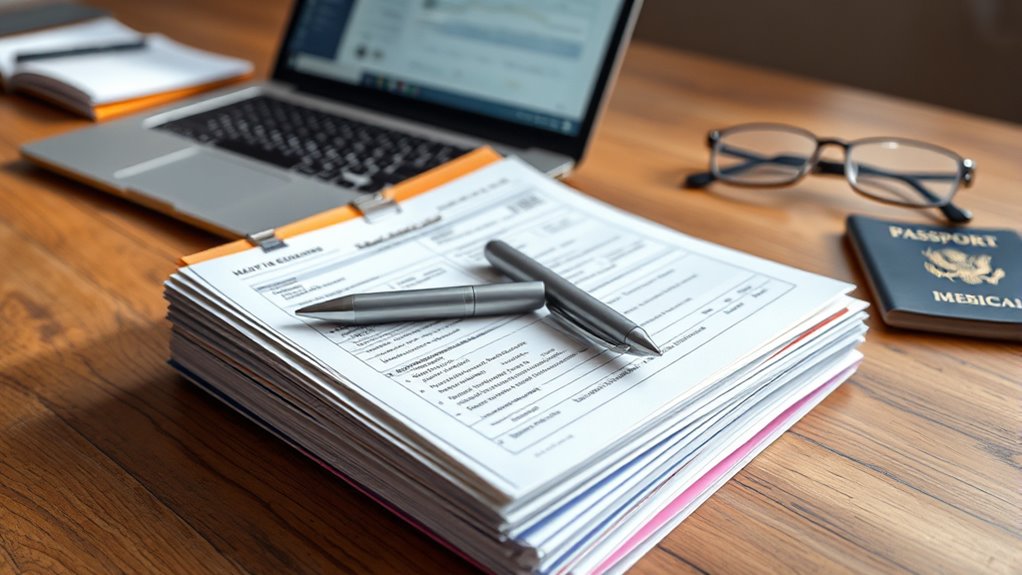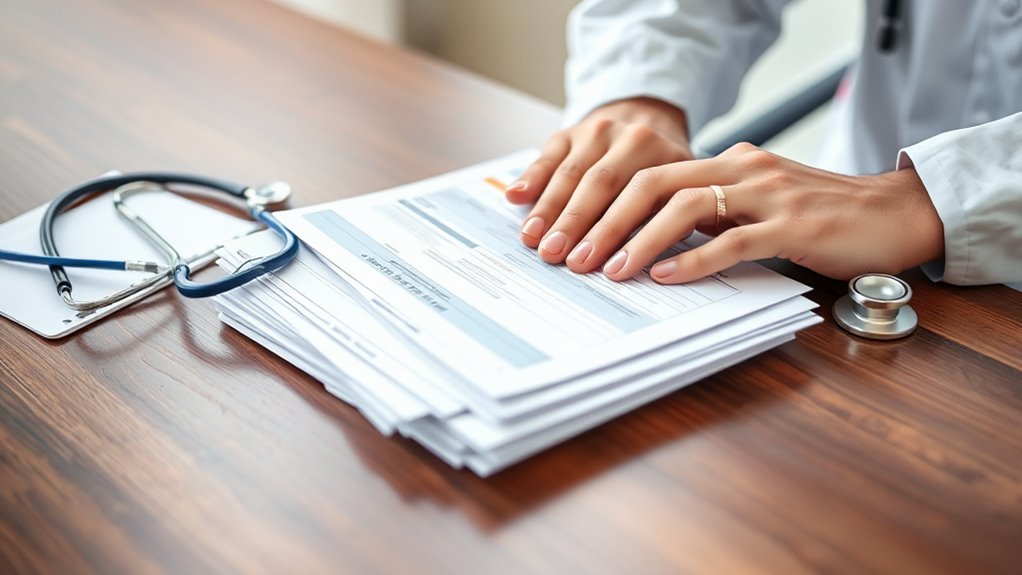To prepare your medical documents for travel abroad, gather and update your vaccination records, making both digital and physical copies. Carry original prescriptions and medication details, verifying their legality in your destination. Store copies securely, keeping digital versions accessible online and physical copies in your carry-on. Consider obtaining a medical letter from your doctor for ongoing treatments. Staying organized guarantees smooth entry and healthcare access—continue to explore these essential tips for a trouble-free trip.
Key Takeaways
- Gather and make both digital and physical copies of vaccination records and ensure they meet destination requirements.
- Prepare a detailed list of all medications, including prescriptions and doctor contact information.
- Carry original prescription bottles and verify medication legality in the destination country.
- Store documents securely, keeping digital copies on protected devices and physical copies in carry-on luggage.
- Review country-specific health regulations via embassy or consulate resources before travel.

Traveling abroad requires careful planning, especially when it comes to your health. One of the most important steps is guaranteeing you have all the necessary medical documents organized and accessible. This includes your vaccination records and prescription details. Having these documents ready can prevent delays at border crossings or health emergencies during your trip.
Start by gathering your vaccination records. Many countries require proof of certain immunizations, such as yellow fever, typhoid, or hepatitis A and B. These records serve as official proof that you’re protected against specific diseases. Make copies of your vaccination certificates, both digital and physical, and store them separately. This way, if one set gets lost or damaged, you’ll still have access to the information. It’s also wise to verify that your vaccination records are up-to-date before leaving, especially if you’re traveling to regions with higher health risks. Contact your healthcare provider or local vaccination center to confirm your immunizations meet the destination’s requirements.
Gather and verify your vaccination records to ensure compliance and protection before traveling abroad.
Along with vaccination records, you should prepare detailed prescription information. Carry a list of all medications you take, including prescription details such as the medication name, dosage, frequency, and prescribing doctor’s contact information. If possible, bring the original prescription bottles, which clearly display your name, medication, and instructions. This can be essential if you need to refill a prescription abroad or if customs officials ask for proof of medication. Additionally, check whether your medications are legal in the country you’re visiting. Some drugs that are common at home may be restricted or require special permits elsewhere.
Storing these documents securely is indispensable. Keep digital copies on a secure cloud service or a password-protected device, so you can access them easily if needed. Also, carry physical copies in your carry-on luggage, not checked baggage, to guarantee they stay with you at all times. If you have ongoing medical conditions, consider obtaining a letter from your healthcare provider explaining your health situation and listing your medications. This can be useful if you encounter medical personnel abroad or face customs inquiries.
Moreover, understanding the importance of medical document security can help you prevent identity theft or loss of sensitive information while traveling. Finally, check if your destination country has specific rules regarding medical documents or medications. Visit their embassy or consulate’s website for guidance. Preparing your vaccination records and prescription details well in advance guarantees you’re protected and ready for any health-related issues that might arise during your trip. It’s a simple yet essential part of travel planning that can save you time, money, and trouble, letting you focus on enjoying your journey.
Frequently Asked Questions
Do I Need Translations for My Medical Documents?
You might need translations for your medical documents to avoid language barriers and meet legal requirements. Check the destination’s rules, as some countries demand certified translations to ensure healthcare providers understand your medical history. Even if not explicitly required, having translated, notarized documents can make your medical care smoother and prevent misunderstandings. Always verify with local authorities or your healthcare provider to ensure you comply with all legal and language requirements.
How Early Should I Start Preparing Medical Documents?
You should start preparing your medical documents at least 4-6 weeks before your trip. This gives you enough time for medical appointment scheduling, guaranteeing your health records are current. Gather insurance documentation early to avoid last-minute issues. Early preparation helps you verify if you need translations or additional paperwork. Planning ahead minimizes stress and ensures you have everything ready, so you can focus on enjoying your travels without medical concerns.
Are Digital Copies Acceptable for Travel?
Imagine holding your important documents in your hand—digital copies can feel just as secure, but always check if they’re accepted. Many countries now accept digital copies, but the key is document authenticity. Make sure your digital files are clear, official, and easily verifiable. Keep backups in multiple formats, and carry both digital and printed versions. Confirm with your travel destination’s requirements to avoid surprises, so your trip stays smooth and stress-free.
What Specific Medical Records Are Required?
You need to gather specific medical records like vaccination certificates, recent lab results, and prescriptions. When considering medical record formats, digital copies are often acceptable, but always check with officials. Keep privacy considerations in mind; only share necessary information and use secure methods. Make sure your records are clear, up-to-date, and in the required format to avoid delays. Double-check requirements with your travel destination’s health authorities to stay compliant.
How Do I Handle Urgent Medical Requests Abroad?
Imagine you’re abroad and suddenly face an emergency. You handle urgent medical requests by keeping your emergency contacts and medication list easily accessible. Always carry a digital or printed copy of your medical records, including allergies and prescriptions. Notify local healthcare providers about your conditions. Staying prepared guarantees swift, effective care, turning a stressful situation into a manageable one, and giving you peace of mind wherever you travel.
Conclusion
Getting your medical documents ready for travel ensures you’re protected and stress-free abroad. Did you know that over 60% of travelers face health issues during trips? Proper documentation can make all the difference, helping you access care quickly and avoid delays. Take the time now to gather, verify, and organize your medical records. Being prepared not only gives you peace of mind but also turns potential health surprises into manageable moments, letting you enjoy your journey fully.








